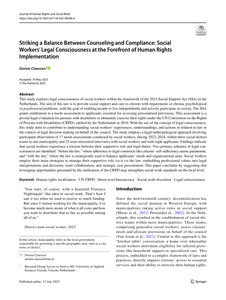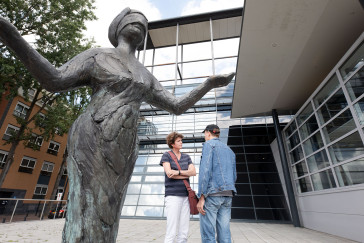De overheid trekt zich terug en legt steeds meer verantwoordelijkheid bij de burger. Dat is reden tot zorg, want door bezuinigingen op bijvoorbeeld de rechtsbijstand kan de toegankelijkheid van het recht in het gedrang komen. Maar er zijn ook kansen. Voortschrijdende digitalisering stelt mensen in staat zelf oplossingen te zoeken bij juridische problemen. Dit kan meer keuzevrijheid en meer zelfstandigheid betekenen, hoewel onzekerheid over dit palet aan mogelijkheden evenzeer op de loer ligt. Een mogelijk bijeffect is dat er nog meer juridische problemen ontstaan, omdat door onzekerheid of onwetendheid kan worden besloten geen rechtszaak te starten, geen aanvraag in te dienen of niet tot actie over te gaan wanneer rechten worden geschonden. Een ding staat vast: het beroep op de eigen kracht van de burger neemt toe. Maar in hoeverre zijn burgers zelfstandig in staat gebruik te maken van het recht en hun rechtspositie te beschermen? De vraag is niet nieuw. Sinds het einde van de negentiende eeuw is hier aandacht voor. Deze aandacht verloopt in golfbewegingen en verandert in de loop der tijd van accent en betekenis. In het huidige tijdsbestek, waarin een transitie gaande is van verzorgingsstaat naar participatiesamenleving is de vraag opnieuw actueel. Als mensen meer op zichzelf zijn aangewezen en zelf oplossingen moeten zoeken voor hun juridische problemen, hoe zet je hen dan in hun kracht? De vraag wat legal empowerment kan betekenen voor de toegankelijkheid van het recht in de Nederlandse participatiesamenleving staat hier centraal. In het eerste hoofdstuk worden de belangrijkste ontwikkelingen in de literatuur over de toegankelijkheid van het recht beschreven. De nadruk ligt hierbij op gebruikers van het recht en het daadwerkelijk kunnen gebruiken van het recht. Dit kader helpt om het concept legal empowerment te kunnen plaatsen. Vervolgens wordt in het tweede hoofdstuk een analyse gemaakt van de achtergrond, de kenmerken en de toepassing van legal empowerment om het begrip beter te kunnen duiden. De lessen die we hieruit kunnen trekken, worden in het laatste hoofdstuk toegepast op de situatie in Nederland, met name op thema’s als de terugtredende overheid, decentralisatie, digitalisering en juridische dienstverlening.
DOCUMENT

This study explores legal consciousness of social workers within the framework of the 2015 Social Support Act (SSA) in the Netherlands. The aim of this law is to provide social support and care to citizens with impairments or chronic psychological or psychosocial problems, with the goal of enabling people to live independently and actively participate in society. The SSA grants entitlement to a needs assessment to applicants, essential for accessing personalized provisions. This assessment is a pivotal legal evaluation for persons with disabilities to ultimately exercise their rights under the UN Convention on the Rights of Persons with Disabilities (CRPD), ratified by the Netherlands in 2016. With the use of the concept of legal consciousness, this study aims to contribute to understanding social workers’ experiences, understandings, and actions in relation to law in the context of legal decision-making on behalf of the council.
MULTIFILE

What do human rights look like when we present them as action-based, bottom-up concepts, and not exclusively as legal items? After all, when we narrow down human rights to a legal concept only, we do not do justice to its meaning. In many professions and branches the idea of human rights is used in jargon, as guiding principles and as a source of inspiration. Human rights make a difference, albeit not necessarily as an enforceable legal concept. This facet of human rights - its practical application beyond lawmakers and lawyers - is deeply underexplored and deserves much more attention. Applied human rights are not per se a matter of lawmaking and enforcement only: it can be part of a mission and vision of companies, it is sometimes at the core of artistic work, it can be a leading principle in social work - especially considering the rights of the child, and it is used as a guiding principle in technological innovation. Human rights are not just for lawyers, but also for managers, engineers, social workers, musicians, local governments, law enforcers, designers and business people. However, and not surprisingly, in each branch the impact and implications of human rights differ. Therefore, it is time for a comprehensive textbook in which the idea of human rights is not exclusively explored as a legal concept, but instead discussed from various applied perspectives. In this book, we explore human rights as an applied concept: as something we do. The chapters are written by an international group of leading experts in a wide range of disciplines and themes, including technology development, social studies, pedagogy, business strategy, public governance, the arts, philosophy and law.
LINK
De laatste jaren is er veel veranderd in het sociale domein, waar bijvoorbeeld de schuldhulpverlening onder valt. Sociale hulpverleners, hebben daardoor meer dan ooit juridische kennis en vaardigheden nodig. In verschillende onderzoeken kijken we hoe bewust sociale hulpverleners omgaan met het recht.

De laatste jaren is er veel veranderd in het sociale domein, waar bijvoorbeeld de schuldhulpverlening onder valt. Sociale hulpverleners, hebben daardoor meer dan ooit juridische kennis en vaardigheden nodig. In verschillende onderzoeken kijken we hoe bewust sociale hulpverleners omgaan met het recht.Doel Hoe bewust zijn sociale professionals, zoals wijkteamleden, zorgverleners en sociaal raadslieden, zich van de juridische gevolgen van hun handelen? Het lectoraat Toegang tot het Recht voert in de periode 2017-2023 verschillende onderzoeken uit waarin dit onderwerp centraal staat. We kijken onder meer naar hulp en recht in sociale wijkteams en sociaal werkers en mensenrechten. Resultaten De afgeronde onderzoeken hebben geleid tot wetenschappelijke publicaties, vakpublicaties en een adviesrapport voor docenten. Wetenschappelijke publicaties Social Workers as Local Human Rights Actors? Their Response to Barriers in Access to Care and Support in the Netherlands (Journal of Human Rights Practice, juli '21). Social Support and Access to Justice at the Kitchen Table? An Assessment of the Legal Capabilities of Community Social Care Professionals in the Netherlands (European Journal of Social Work, juli 2019). Tussen Burgers en Recht Lokaal? Sociaal Raadslieden over Toegang tot Zorg en Ondersteuning Tussen burgers en mensenrechten lokaal: Sociale professionals over toegang tot zorg en ondersteuning Sociaal werk: Een mensenrechtenberoep bij uitstek? Met recht een zorg: Lokale sociale professionals als poortwachters van de Wet maatschappelijke ondersteuning 2015. Translators, Advocates or Practitioners? Social Workers and Human Rights Localization Hulp en Recht aan de Keukentafel: De toegang tot de Wet maatschappelijke ondersteuning volgens lokale professionals Vakpublicaties Fundamentele rechten: De sociaal werker draagt een mensenrechtenbril. In: Vakblad Sociaal Werk, nummer 6, december 2017. Adviesrapport Sociaal werk en Mensenrechten Animatie VN-verdrag Handicap binnen de Wmo 2015 Deze animatie is het resultaat van interprofessionele samenwerking van het Lectoraat Toegang tot het Recht met professionals uit de praktijk en het onderwijs. Het is het afstudeerproject van Britta Bavelaar (Sociaal Juridische Diensverlening) binnen het promotieonderzoek 'Human Rights and Social Work: Challenges of local professionals at the frontline’. Het laat zien hoe de Wet Maatschappelijke Ondersteuning (WMO) en het VN-Verdrag Handicap verbonden zijn en hoe dit wijkteams kan helpen bij goede besluitvorming en het realiseren van gelijke rechten voor iedereen. Looptijd 01 januari 2017 - 31 december 2023 Aanpak